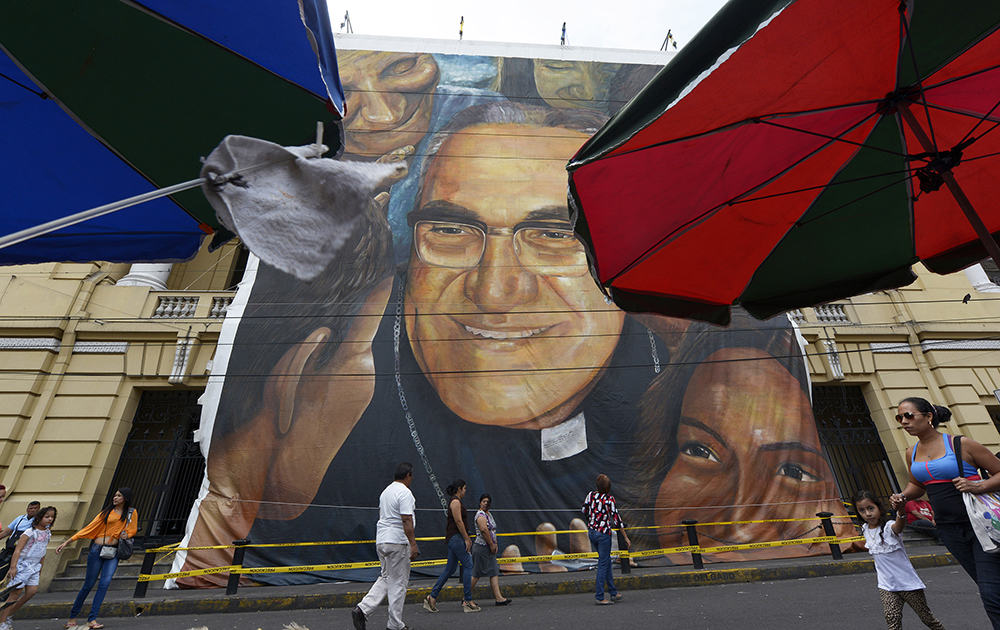SAN SALVADOR, El Salvador — Archbishop Óscar Romero was a symbol of the divisions that split El Salvador during its civil war, but 35 years after his assassination, his imminent beatification has united former foes.
Romero, an outspoken critic of social injustice, was gunned down while celebrating mass on March 24, 1980, at the outset of the conflict, a day after exhorting soldiers to stop killing civilians.
His murder propelled the country deeper into a brutal war that raged until 1992, when the right-wing government signed a peace deal with the leftist guerrillas of the Farabundo Martí National Liberation Front (FMLN).
No one has ever been convicted of the crime, but a U.N.-sponsored truth commission concluded it was carried out by a right-wing death squad under the orders of Roberto D’Aubuisson, a former army officer who died the year the war ended.
Even after peace was restored, Romero’s legacy continued to divide El Salvador, where the movement to make him a saint pulled at the country’s fault lines. A champion of the poor nicknamed the “Voice of the Voiceless,” Romero has been heralded on the left and condemned as a communist on the right.
He has also been a divisive figure for the Catholic Church.
His support for the oppressed has seen him held up by some as a proponent of “liberation theology,” a political movement rooted in Latin America that advocates working with the poor to bring about social change. While Romero did not actually subscribe to the theology, conservative Catholics feared his death could be exploited for political or ideological reasons.
Under Pope John Paul II, the Vatican blocked the movement to canonize him. But Pope Francis, who has himself sought to defend the poor, cleared the way for him to be beatified, naming him a martyr for the Church last month.
The Church announced this month that Romero will be beatified on May 23 at a ceremony in San Salvador, taking him to just one step from sainthood.
That news has been widely celebrated in El Salvador, even in hard-right circles that once demonized him.
“It’s a step forward and a cause for joy for the Catholics of El Salvador,” said former president Armando Calderón, a conservative hardliner who was close to D’Aubuisson.
‘Justice never done’
The tributes to Romero began last Saturday with a candlelight march from San Salvador’s central square, where he will be beatified in May, to the capital’s cathedral, where pilgrims held a vigil at his tomb until dawn. Commemorations were also held in Boston and Washington last weekend, where Mayor Muriel Bowser officially inaugurated an affordable housing project named for him.
On Tuesday, Salvadorans will remember him at masses in his honor across the country, and with a ceremony in San Salvador cathedral led by Panamanian Cardinal José Luis Lacunza.
“We are commemorating another anniversary of his death, but we are incredibly happy because Monsignor Romero will soon be beatified,” said Gregorio Rosa Chávez, the Auxiliary Bishop of San Salvador.
The anniversary has also stirred new calls for justice in Romero‘s killing.
“The murder of Monsignor Romero is one of so many crimes committed before and during the civil war that remain unpunished. Justice has never been done,” said David Morales, special prosecutor for human rights cases.
Romero was shot through the heart by a sniper while performing evening mass in the chapel of San Salvador’s Divine Providence hospital. The day before, he had delivered a homily aimed at ordinary soldiers, urging them to halt the growing wave of atrocities committed by the army as it sought to stamp out the burgeoning leftist rebellion gripping the country.
“I beg you, I plead with you, I order you in the name of God: stop the repression,” he said.
Romero‘s life was depicted in the 1989 film “Romero” starring Raúl Julia.
His murder had widespread impact across Latin America, a predominantly Catholic region where several far-right regimes were then fighting wars against Marxist guerrillas.






